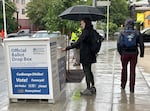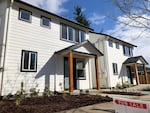Editor’s note: Election Day is Tuesday, Nov. 5. Stay informed with OPB on the presidential race, key congressional battles and other local contests and ballot measures in Oregon and Southwest Washington at opb.org/elections.

File photo taken at a drop box near the Multnomah County Elections Division offices, Portland, Ore., May 21, 2024.
Conrad Wilson / OPB
When Dakota Becker was figuring out where to live in his hometown of Hillsboro, he quickly realized renting would put his long-term goal of buying a house farther out of reach.
“If I were to go out and rent, when would I ever be able to save up for a house?” Becker said.
The 25-year-old lives with his parents in a house they own.
Related: What you need to know about voting in Oregon and Southwest Washington
“But I’m thankful that I’m in a position where, hopefully within the next year, I’ll be able to buy a place.”
Becker considers housing the most important issue facing Oregon — a view he shares with many voters across the state.
Ahead of this autumn’s election, OPB partnered with Portland-based polling firm DHM Research to survey 600 Oregonians between the ages of 18 and 40, using phone interviews and online questionnaires. The results have a margin of error of plus or minus 4%. When asked an open-ended question about the most important issue facing the state, nearly 55% of respondents said homelessness or housing affordability.
“What really matters to them is their economic concerns,” said John Horvick, senior vice president at DHM Research.
He said older Oregonians may have the impression that voters under 40 only care about the environment, abortion or racial justice.
“It’s not like those get super low numbers, but they’re quite a bit lower than those top line economic numbers,” Horvick said. “This election’s going to be much more about the economy than it’s going to be about abortion.”
Related: Issues important to Oregon voters
Positive economic indicators aren’t impacting pocketbooks
Economic issues often rank of high importance among U.S. voters, young and old. Heading into this year’s presidential election, many national economic indicators paint a rosy picture. The unemployment rate is low, hovering around 4% nationally and in Oregon. Inflation has cooled to match the federal target of around 2%. Overall, analysts at consulting firm Deloitte show the U.S. economy has grown by 2.7% this year.
But there’s a real disconnect between those indicators and the economic reality of most households, according to Regina Lawrence, associate dean at the University of Oregon’s journalism school.
Related: Listen to 'OPB Politics Now'
“Politicians, policymakers, regulators — the information they look at does not seem to be connecting very well with the data that a lot of ordinary people are paying attention to in their own lives,” Lawrence said, “Which seems to really boil down to things like prices. Inflation is no longer going up the way that it was, but have prices fallen back down to where they were a couple of years ago? No, they haven’t.”
Lawrence said that when looking at poll results, the information can be both indispensable and highly limited. Multiple things can affect the results of a single poll, but Lawrence points to national surveys that also show younger voters are highly focused on economic issues.
Housing issues as a symbol of economic discontent
When considering how to vote in the upcoming election, 80% of respondents to OPB’s poll said housing is extremely or very important in their decision-making. Among a range of social, economic, and cultural issues, only homelessness resonated with more respondents: 83% of people surveyed said it was extremely or very important when considering how to mark their November ballots.
Lawrence said that stood out to her as a clear indication that younger Oregonians are very concerned about homelessness, and that could be among the reasons why half of the respondents said overall, Oregon is on the wrong track.
“Homelessness is one of those issues that it’s very visual for people,” Lawrence said. “It becomes a symbol of, ‘Oh, no! Things are in disarray, people aren’t being cared for, the streets don’t feel welcoming.’”
Those two top issues are closely connected. Research shows that the rising cost of housing in Oregon is the main contributor to the large number of people experiencing homelessness in the state.
Housing affordability is the top concern for 36-year-old Medford resident Kira Herdklotz-Yasutake when she’s contemplating how to vote. She tends to lean liberal but is turned off by the finger-pointing from both parties. Instead, she wants politicians to focus on finding solutions that benefit rural areas and smaller cities, like where she lives.

A help wanted sign is posted on a restaurant in Media, Pa. (AP Photo/Matt Rourke)
Matt Rourke / AP
Over the 25 years she’s lived in Oregon, she says it’s only gotten harder for those below the poverty line to find and afford housing, let alone find job opportunities and climb into the middle class.
“The places that are providing opportunities,” Herdklotz-Yasutake said, “are not providing the right opportunities.”
She works a couple of nights a week as a self-employed karaoke DJ, and her alternative rock band makes money when they score gigs. For her day job, Herdklotz-Yasutake was working in the hotel industry until her position went away. She’s applying for unemployment benefits while looking for a new job.
In the past, she’s attempted to get housing assistance through the state, only to find out it can take years to get help. On top of that, Herdklotz-Yasutake said the requirements are so specific it can be challenging to jump through all the hoops.
“A lot of the concern I tend to have is not just in terms of what’s available,” she said, “It’s the lack of people available to assist in the housing authority, in the unemployment office — in the places that are supposed to be helping those that are struggling.”
She’d like to see more politicians focused on making these services easier to access. For her own housing, Herdklotz-Yasutake has worked out a unique situation with her parents: they bought a rental property, hired a management company to run it, and are now renting it to Herdklotz-Yasutake and her housemates.
Oregon’s high cost of living could drive people away
The rising costs in the state are feeling so unsustainable for some young people that they’re looking for a way out. Nearly a quarter of survey respondents, 24%, indicated that they would prefer to live someplace other than Oregon two years from now. People who identified as either politically conservative or moderate, as well as people without a bachelor’s degree and people of color, were more likely to want to leave the state, according to the survey DHM conducted for OPB.
The reasons why young people in Oregon might be dreaming about living elsewhere are varied, but there was one clear trend among survey respondents OPB spoke to: the cost of living, especially high housing costs, had become too burdensome.
“The cost of living is just astronomical right now,” said Erin Pascoe, a nanny who lives in Portland’s West Slope neighborhood.

A pair of newly constructed homes are up for sale in Southeast Portland on April 4, 2023
Tiffany Camhi / OPB
Pascoe was born and raised in the Portland metro area. And she’s lived in several other places, including expensive cities like Los Angeles.
“Just watching the steady increase of rent but no improvement to some of these places is interesting. I feel like it’s happening all over,” said Pascoe, who moved back to Portland two years ago to be closer to her mother. “But even coming to Portland, I’m just like, ‘That’s what they’re charging for that?’”
Survey respondents from other parts of the state cited Oregon’s gun control laws and heavy regulation of agriculture as other reasons they want to leave the state. Nearby states like Washington, Idaho and Montana appear to be top choices over Oregon.
But even though some young people are unhappy with the current quality of life in the Beaver State, the chances they’ll actually pack up and leave are low. Only 11% of those polled said they were likely to move away in two years.
Pascoe is leaning toward leaving. Most of her family and friends have already moved out to other states. She said Portland is a vastly different city from her youth, and it no longer feels like home.
“I don’t know where I’ll be, but I don’t think I’ll be here,” Pascoe said.
The ones who want to stay
Despite misgivings and economic worries, more than 60% of respondents said they would like to be living in Oregon two years from now.
That includes Becker, the 25-year-old Hillsboro resident saving to buy a home.
“I think the issue with housing is just a shortage of homes, and I think it’s really important that young people are able to buy houses and build wealth that way,” Becker said. “I think local government does have a lot to do with that — with how much funds are diverted to building more homes.”
Becker considers himself politically moderate and has not decided how he’ll vote in the upcoming election. He wants to see politicians work to make it easier for people his age to become first-time home buyers by halting institutional investors from snapping up the supply of single-family homes, and he’s listening to how candidates talk about interest rates.
As he contemplates how to cast his ballot, Becker is frequently talking about politics and the economy with his friends.
“There’s just a general consensus,” Becker said, “whether you’re on the left or the right, that right now — especially for young people — this economy just is not working for us.”